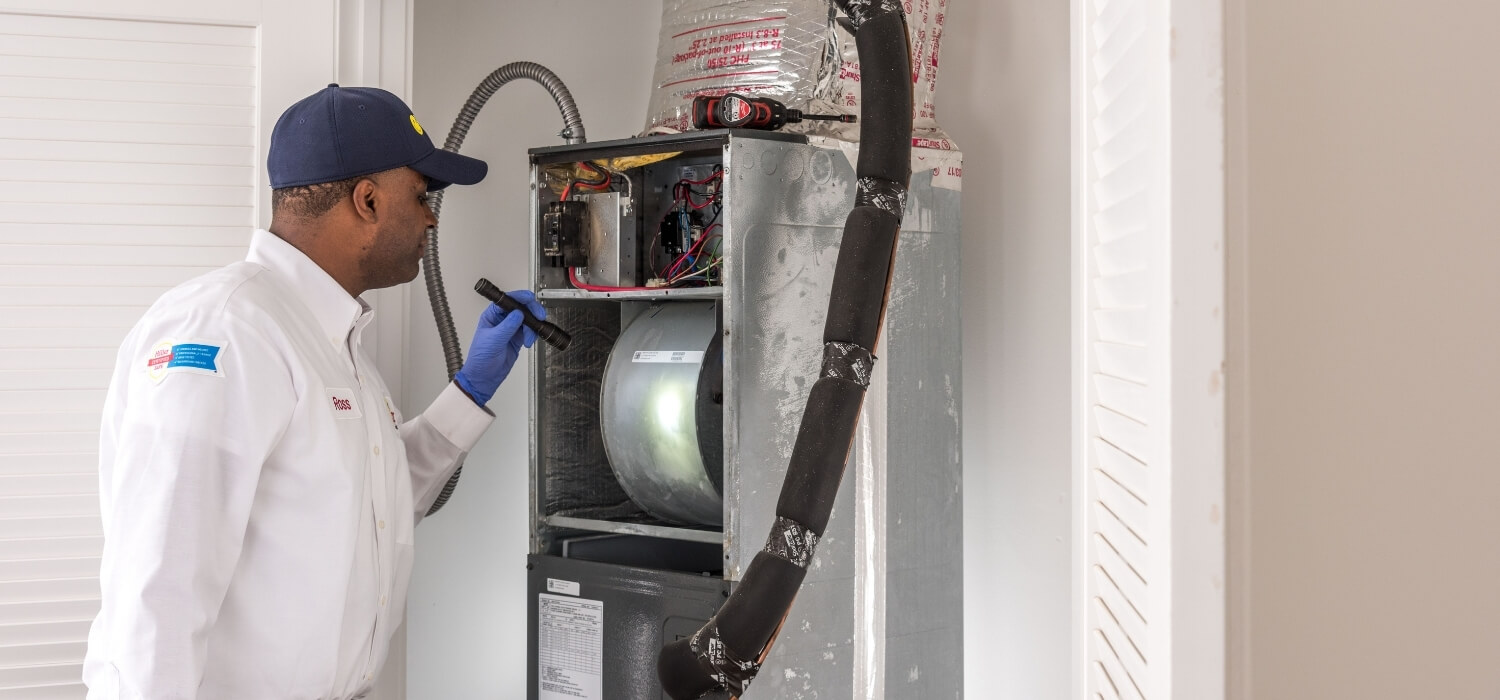Heating systems are like our bodies; regular checkups can catch issues before they become dangerous and costly down the line.
Heating tune-ups are inspections or repairs of your heating system so that it runs efficiently and safely. They’re just like servicing a car. Regular tune-ups can more than double the lifespan of your heating system. So why get a heating tune-up?
Benefits of a Heating Tune-Up

Your heating system often uses between 40-50% of your home’s energy cost, split between heating. The average energy efficiency increase after a heating tune-up is 30% – that’s right, 30% lower heating bills. The average house also loses 20% of costly heated air through leaks in the ductwork. That means savings of up to $400 a year or more on heating costs.
Heating systems are like our bodies; regular checkups can catch issues before they become dangerous and costly down the line. Here are 5 of the most important reasons why a heating tune-up by Happy Hiller can save you money and stress in the long run:
1. Lowering Costs, Increasing Efficiency:
Regular heating tune-ups keep your units working efficiently. An efficient system is a cheaper, cost-effective system. Regular professional tune-ups don’t just prevent disaster; they also reduce costs throughout the year.
Ductwork checks are included in our heating tune-ups. What is Ductwork? Ductwork refers to the air ducts in your home. Air ducts are the tubes or tunnels through your home. Your heating unit uses these ducts to create a flow of air to different areas of your house.
Damaged air ducts can cause inefficiencies in your heating system and overload your unit. Air ducts that are too small can cause backed-up air, increasing pressure on your heating system and reducing efficiency. The common myth that closing individual vents in your house to rooms that you do not need to warm will reduce costs, but this only puts more stress on the furnace.
If you reduce the number of open vents, it forces the furnace to pump the same air volume through a smaller space. Your heating unit is usually a central unit. That means shutting off vents does not decrease the furnace’s energy usage. Small vents can also result in certain areas in your home, receiving too much airflow and heat.
Large ducts can be equally problematic. Your heating system will have to work for longer to move air through those ducts, leading to large bills.
Heating tune-ups help measure the airflow and temperature fluctuations to determine whether there are damages in your air ducts or whether changes should be made to reduce repair costs on your heating unit. Inefficient systems work harder and longer to keep your home at the same temperature. During exceptionally low temperatures, the stress on a weak system increases exponentially.
2. Fewer Breakdowns:
One faulty element in your heating system can put a strain on the entire system and cause other components to break. No homeowner wants to replace their entire furnace right before the holidays. In extremely cold or remote environments, a breakdown of your heating system could be very dangerous.
Breakdowns during busy periods, such as mid-winter, can be even more frustrating. Busy technicians, along with potential emergency costs, can make a broken heating system very costly. It’s always easier to budget repair costs or potential investments ahead of time.
Without regular maintenance, many manufacturing warranties will become void. Manufacturers of heating units understand the importance of regular tune-ups to maintain an efficient and lasting system. Warranties typically need at least annual tune-ups to maintain coverage. Such a breakdown can raise the costs of repairs and replacements of even faulty heating units.
Regular tune-ups can help you maintain your warranty for years, saving big on any issues or malfunctions in your heating unit down the road.
3. Carbon Monoxide Leaks:
Our professional HVAC technicians will be able to spot any issues with the exhaust line in your heating unit. Leaks from an exhaust line can be severe and lead to carbon monoxide poisoning. Carbon monoxide causes 500 deaths a year on average.
Our technicians can sometimes see carbon monoxide leaks only through inspecting the gas burners on your furnace. If the flame is blue, this usually indicates the gas in your furnace is completely burned – while a yellow flame can mean that the gas isn’t burning correctly. Improper burning can mean a carbon monoxide leak.
Carbon monoxide prevents the body from absorbing oxygen properly and causes headaches, nausea, and even death. Since the gas is colorless and odorless, make sure that you make sure to install carbon monoxide sensors besides carrying out regular heating tune-ups. If you already have sensors, it may be best to use this time to check and replace your sensor’s batteries. These can often be overlooked or forgotten, but they are an important and inexpensive safety device for any home.
Carbon monoxide is produced naturally during the heating process when fuel is used. The poisonous gas is usually contained within the heat exchanger in your heating system and expelled from your home via its flue vent. Heat exchangers can form cracks and holes from the metal’s constant expansion and contraction as your heating unit warms and cools. Blockages in the venting system or wrong installation can also cause a build-up and carbon monoxide leaking.
Heating tune-ups involve inspecting the heat exchanger within your unit to ensure proper fuel combustion and heat transfer. The heat exchanger itself is inspected for holes or minute cracks that could lead to carbon monoxide leaks.
4. Lower Carbon Footprint:
An efficient system also means a lower carbon footprint. Less wasted fuel means cleaner air for you and your neighbors. Thermostat calibration is key to reducing cost as well as environmental impact.
Programmable thermostats make sure the correct amount of heat is being emitted from your heating unit to ensure proper function, increase efficiency, and possibly reduce costs. These kinds of thermostats can reduce output from your heating unit at times when extra heat is not necessary to maintain the temperature.
If you often have to adjust or recalibrate your thermostat, it’s possible that your heating unit is not functioning as it should. Remember, those thermostat batteries also may need to be changed!
5. Improved Air Quality:
Forced air heating systems can build up soot, dust, and sediment during the year. Our tune-ups will clean this out and keep your heating system producing clean air for your home. Cleaning the heating system reduces the risk of aggravating allergy and asthma conditions.
Faulty heating units will also often fail to distribute air evenly throughout the building, often causing individual rooms to be hotter or colder than others. Keeping each room comfortable and breathable needs a healthy functioning heating unit.
Remember that heating units themselves need breathing space. Restricted airflow can put an unnecessary strain on your heating units and cause them to be more prone to breakdowns. Refrain from leaving items or furniture too close to furnaces – especially if those items are combustible. Examples of flammable materials could include paint, cleaning solutions, old papers, or fabrics.
Symptoms of a dirty furnace may include:
- The air quality in your home is not satisfactory.
- Your gas bill is more expensive than usual.
- Heat or duct registers won’t heat up as successfully.
Heating tune-ups include the replacement furnace filters in your heating unit to improve your heating unit’s airflow. Better airflow helps increase your unit’s efficiency, longevity, and reduce gas leaks. Holding your air filter up to the light should be enough to check whether it needs to be replaced. If the light doesn’t shine through properly, it’s probably time for a tune-up. When your air filter is replaced, please take note of the date and check it regularly.
Contents of a Heating Tune-Up

During a heating tune-up, our experienced technicians will assess what work or replacements are necessary to keep your unit running smoothly and safely for as long as possible. The following are important examples of the checks and fixes our technicians will carry out and which issues they prevent.
- Cleaning heating elements and the heat exchanger prevents blockages, exposes any cracks or holes in the exchanger, and keeps the system functioning efficiently.
- Monitoring the flue draft ensures that your venting system is working correctly and that potentially harmful carbon monoxide is efficiently and safely removed from your home without blockage or escape.
- Cleaning and replacing air filters maintain a good quality of air in your home, reducing aggravation of respiratory or allergy issues. Clean air filters also make sure your unit can release heat properly and evenly, reducing strain on your compliance and increasing its lifespan.
- Measurement of temperature changes allows us to check the efficiency of your unit and reduce your heating bill.
- Examining the thermocouple in gas or oil furnaces lowers the risk of explosion.
These are just some of the examples of a professional heating tune-up. Th
ese procedures need professional experience. Although heating tune-ups are a preventative solution, prevention is always cheaper, safer, and better for your family and home. Suppose your heating unit is damaged and needs to be replaced. In that case, it is always better to carry out replacement far before temperatures drop. Waiting for deliveries, installations, checks, and spare parts are never fun in the freezing cold. For a detailed breakdown of signs that your heating system needs maintenance, check out our list of telltale signs.
Schedule an Appointment

All manufacturers of furnaces recommend annual inspections and, if necessary, maintained by a certified technician. Ensure that the technician you hire to carry out a heating tune-up is professional and certified, much like our technicians here at Hiller. Subpar inspections or tune-ups can be even more dangerous than not having one. You may falsely believe that your furnace is working correctly.
Neglecting to carry out an annual heating tune-up for your home may not result in costly repairs during the winter months. Preventative costs are always far lower than repair costs – especially during the winter or holidays.
Deciding not to opt for an annual heating tune-up can bring unexpectedly high prices or dangers, not a welcome event during the holidays. Luckily, at Hiller, we adopted a completely transparent pricing structure. With our True Transparency Pricing, you’ll know almost the exact cost before repair and receive an itemized list of all tasks performed, materials, and supplies used on the job. At Hiller, there are no unexpected hidden costs. We use fair market prices to sell each of our parts and only replace what is necessary to keep your furnace running smoothly and safely.
Suppose this all sounds complicated and time-consuming, for at least two annual tune-ups, free diagnostics, and 10% off all repairs (no matter the cost). In that case, the Happy Hiller Club has you covered. Let us take care of your home and keep costs low and predictable.
Before you turn on your furnace this year, make sure it works efficiently and safely. Contact us today to keep you and your family safe and warm this winter.

 Daily Promotion
Daily Promotion